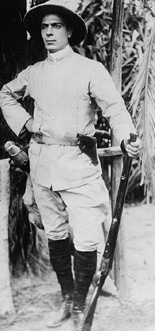Daily Archives: July 5, 2007
The Natives Are Restless
Today David Broder looked through his telescope and spotted native savages just beyond the Potomac. 
The belief that official Washington is deaf to the people’s wishes is a staple of political rhetoric for both Republicans and Democrats — even those, including Thompson, who have operated inside the Beltway for decades.
Let a reporter who is not running for anything suggest that exactly the opposite may be true: A particularly virulent strain of populism has made official Washington altogether too responsive to public opinion.
The sight of those spears and feathers and tribal campfires must’ve upset poor Broder’s chintz-and-teacup sensibilities.
From Aristotle to Edmund Burke, philosophers have written of the healthy tension that normally exists between the understanding and strategies of leaders and the sentiments and opinions of their people.
We simple tribal people should let Bwana make our decisions for us.
In today’s Washington, a badly weakened president and a dangerously compliant congressional leadership are no match for the power of public opinion — magnified and sometimes exaggerated by modern communications and interest group pressure.
Any minute now, the savages will break into Broder’s tastefully appointed study and leave mud on the hand-made Turkmen carpeting.
[The immigration bill] was buried by an avalanche of phone calls to the Capitol from good citizens decrying what they had been told on many talk radio stations and by some conservative politicians: that it was an amnesty bill.
People were misled by talk radio and some conservative politicians? So shocking. All my delusions are shattered.
The “fast-track” process, in which Congress casts only an up-or-down vote on trade deals negotiated with other countries, has been the key to a vast expansion in world trade. But the resulting trade agreements have run into populist protests from labor and liberal groups that blame them for the loss of U.S. manufacturing jobs.
The Bush administration has responded to Democratic pressure by including enforceable new labor and environmental standards in several pending bilateral trade agreements. But the action by the House means that any further deals are unlikely as long as Bush is president.
“Fast track” is, of course, a policy set by the wise and thoughtful Washington political class who know better than we natives do what’s good for us. Public Citizen mourns:
After a brief, damaging existence, Fast Track was pronounced dead on June 30, 2007.
The demise of Fast Track allowed the U.S. Founding Fathers to stop rolling in their graves over Fast Track’s trampling of constitutional checks and balances. As well, victims of Fast Track-enabled trade agreements welcomed the news, given the anomalous procedure’s record of damage despite having been locked up and out of commission for blocks of time since its inception. …
… Fast Track delegated away Congress’ exclusive constitutional authority over trade – allowing the executive branch alone to choose trading partners, set the substantive terms of trade policy, and even sign trade agreements, all before Congress ever voted. The controversial delegation mechanism allowed Congress only a yes or no vote on trade agreements after they had been negotiated and signed and by its very design shut out public and congressional oversight. …
… Fast Track’s lifelong philosophy was, “Just trust the president.” Even after being kept in chains for much of its existence, Fast Track’s legacy includes millions of peasant farmers who have been displaced by fast-tracked trade deals, workers whose wages have remained stagnant since Fast Track’s hatching in the mid-70’s, millions of Americans made ill by fast-tracked trade deals that required food imports not meeting U.S. safety standards, the evisceration of the U.S. manufacturing base, and much more damage. Many Americans celebrated Fast Track’s long overdue demise and joined a national day of prayer for a better procedure that in the future could replace Fast Track to ensure trade agreements would benefit the majority.
Those deeply connected to Fast Track, including President Bush and representatives of the National Association of Manufacturers, the American Chamber of Commerce, Pharma and other corporate lobbies, gathered at board meetings and campaign fundraisers to mourn their loss.
Let’s go back to Bwana Broder:
… ending the president’s negotiating authority will only do our country damage. …
…The point is pretty basic. Politicians are wise to heed what people want. But they also have an obligation to weigh for themselves what the country needs. In today’s Washington, the “wants” of people count far more heavily than the nation’s needs.
Broder finishes his column and calls upon his houseboy for more tea. Inside, all is civilized and orderly — silver polished; blinds lowered, privileges protected. Outside the natives paint themselves and sharpen their spears, wailing for their lost jobs and the growing harshness of their lives.
See also: Harold Meyerson, “Global Safeguards for a Global Economy.”
